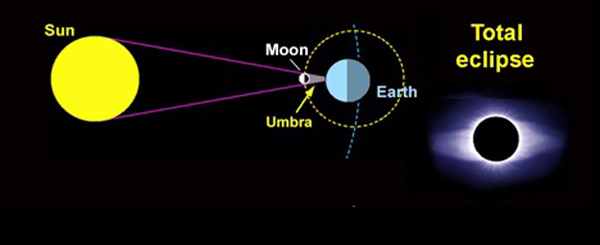Resources about the 2024 eclipse from various local and national organizations and entities.
Local activities will be added as they are known.
12P/Pons-Brooks is a comet that will be visible at the same time period as the 2024 solar eclipse. 12P/Pons-Brooks is expected to be at its brightest in late March/early April, although its brightness varies unpredictably. It can be viewed by looking toward the constellation Pisces located at the end of evening twilight in the west-northwest part of the sky. 12P/Pons-Brooks has also been nicknamed the "devil comet" because its activity can sometimes give it a horseshoe-shape resembling horns.
Google Search
solar eclipse|occultation 2024
Google Books Search
solar eclipse|occultation 2024
Google Scholar Search
solar eclipse|occultation 2024
On April 8, 2024, a total solar eclipse will pass over the United States. The path of totality will include Terre Haute and Indiana State University at approximately 3:04:18 PM EDT.
Let's hope for clear skies. Remember that while Terre Haute, IN, is in Eastern time, Illinois and parts of Indiana and Kentucky are in Central time. So make sure you know the right time for your area! DO NOT LOOK AT THE SUN WITHOUT APPROPRIATE EYE PROTECTION.
Read below to learn more.

Do NOT look at the sun without proper protection. You can damage your eyes.
(Ordinary sunglasses are not proper protection.)
An eclipse is a situation amongst three astronomical objects in which one moves between the other two creating a shadow, effectively blocking the view of the first astronomical object from the third astronomical object. A solar eclipse is when the moon moves between the Earth and the sun, totally blocking the view of the sun from those on Earth who are within the moon's shadow. A lunar eclipse is when the Earth is between the moon and the sun, blocking the view of the sun from the moon (if you happened to be on the moon).
Solar eclipses happen periodically. However, each individual solar eclipse impacts only a relatively small portion of the Earth. They also rarely occur nearby to where YOU are so that you can easily witness it for yourself.
You may find out what is known about eclipses within the information sources such as books, journal articles, newspapers, websites, and other forms of communication. An eclipse is also known as an occultation. If you search for information, try searching that word, too.
Below are some links to information about eclipses and the 2024 total solar eclipse.
Do NOT look at the sun without proper protection. You can damage your eyes.
(Ordinary sunglasses are not proper protection. Only use eye wear or solar binoculars that meet ISO 12312-2.)
 |
Playlists below include clips from the ISU video databases which explain or are related to eclipses. Some are about the science and some include portrayals of eclipses from dramatic film.
You, too, can create playlists of films or film clips on topics which interest you. Create a personal account in order to create playlists.
 |
Please contact science librarian Shelley Arvin if you have questions about the eclipse.
Shelley Arvin
Office phone 812-237-2605
Library room 113
ECLIPSE PARKING –
Use our databases to search for published research and information about organisms and eclipses.
 Total eclipse of the sun in 1900. Letter from the Acting Secretary of the Treasury, transmitting, for the consideration of Congress, a copy of a communication from the Secretary of the Navy, submitting an estimate of appropriation for observations of the
by
Total eclipse of the sun in 1900. Letter from the Acting Secretary of the Treasury, transmitting, for the consideration of Congress, a copy of a communication from the Secretary of the Navy, submitting an estimate of appropriation for observations of the
by
 Ancient Astronomical Observations and the Accelerations of the Earth and Moon
by
Ancient Astronomical Observations and the Accelerations of the Earth and Moon
by
 Eclipses of the sun
by
Eclipses of the sun
by